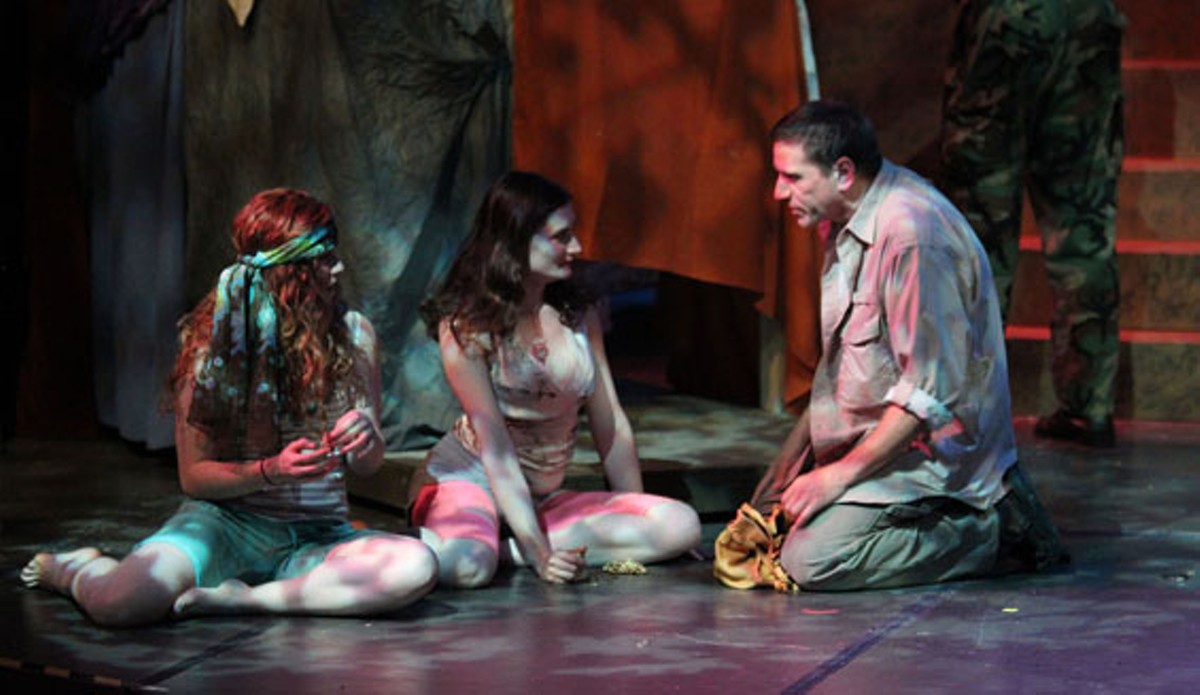St. Louis Shakespeare opens its 29th season with a first for the company: Timon of Athens, one of Shakespeare's more problematic plays. It's widely accepted that Timon has a cowriter, which means that some of what's spoken is not technically Shakespeare. Figuring out who wrote what is a task best left to the experts, but there are moments in this tragic fable when the dialogue does not flow as mellifluously as you'd expect, and you think, "Well, chalk that up to the other guy."
Still, a great deal of the fun in attending any Shakespeare play is seeing how the director and company make a 400-year-old text relevant to a modern audience. Director Milton Zoth and St. Louis Shakespeare do a marvelous job of that here.
Timon (Michael Brightman) is a generous and popular Athenian noble at the start of the play. Dressed in a fine linen suit of modern provenance, Timon counts senators and military leaders as his close friends. And why wouldn't they be friends with him? He hosts lavish feasts and gives out jewels as party favors — the very picture of conspicuous consumption.
Except there is a streak of genuine charity running through all Timon's actions. Informed that an acquaintance is imprisoned for not paying his debts, Timon immediately sends money to bail the man out (plus expenses), saying, "It's not enough to help the feeble up, but to support him after."
Timon's friends in politics have no such need to help others, as Timon discovers when he goes broke from giving. Senators and fellow nobles turn their backs on his requests for loans, pleading hardship of one sort of another. One lord (Patty Ulrich) delivers the truth with revealing bluntness: "I have no power to be kind," she says in a wintry tone. It's a persistent problem at the higher levels of government, isn't it?
Zoth has honed this production to a sharp edge, trimming characters and scenes (the Artist and the Poet are gone, as is Timon's run-in with bandits) in order to focus on the core problem of Timon's life. When he has money, he has power and supporters. In the absence of money, he has nothing. And so Timon turns to hermitry and nihilism, spurning the world and all in it for a cave.
Brightman is effectively playing two characters who share a name. Timon in the first act is kind, soft-hearted, able to not only laugh at his sole critic, Apemanta (Maggie Murphy, who makes an excellent verbal sparring partner), but invite her to enjoy his bounty with lordly bonhomie. In the second half, he's wild and vituperative, slashing out insults at everyone in sight. Brightman (and Zoth) make it clear that Timon doesn't take this heel turn because he's penniless and homeless. It's because his friends — who are effectively the government and nation — have turned their back on him in his hour of need.
It is the greed and selfishness of lords and senators that he rails against at the onset of the second half. Standing on the twilit stage, the silhouette of the darkened city behind him, Timon urges chaos and murder on Athens in no uncertain terms. "Bankrupts, hold fast; Rather than render back, out with your knives and cut your trusters' throats. Bound servants, steal." It's a chilling scene well played, and a reminder that a cold heart breeds a more dangerous enemy than kindness and compassion ever did.






